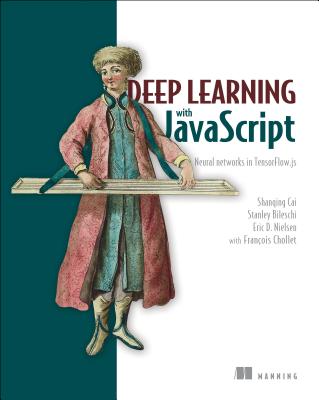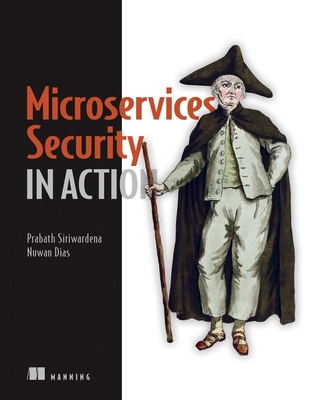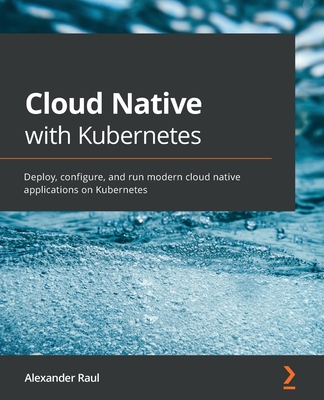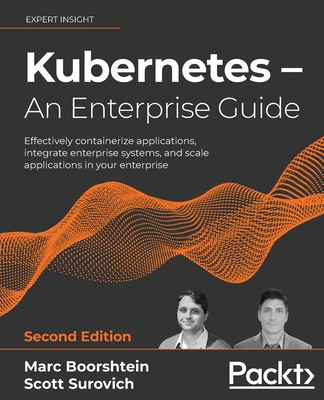Platform Engineering on Kubernetes (Paperback) (Kubernetes 平台工程)
Salatino, Mauricio
- 出版商: Manning
- 出版日期: 2023-12-05
- 售價: $2,170
- 貴賓價: 9.5 折 $2,062
- 語言: 英文
- 頁數: 312
- 裝訂: Quality Paper - also called trade paper
- ISBN: 1617299324
- ISBN-13: 9781617299322
-
相關分類:
Kubernetes
立即出貨 (庫存 < 3)
買這商品的人也買了...
-
 Arduino 官方正版 Genuino 101
Arduino 官方正版 Genuino 101$1,700$1,700 -
 Raspberry Pi 3 Model B+ (UK製)
Raspberry Pi 3 Model B+ (UK製)$4,620$4,389 -
 JVM Performance Engineering: Inside OpenJDK and the HotSpot Java Virtual Machine (Paperback)
JVM Performance Engineering: Inside OpenJDK and the HotSpot Java Virtual Machine (Paperback)$1,980$1,881 -
 晉昇軟體最高殿堂:Jenkins2 持續整合大師之路
晉昇軟體最高殿堂:Jenkins2 持續整合大師之路$600$474 -
 Deep Learning with JavaScript: Neural Networks in Tensorflow.Js
Deep Learning with JavaScript: Neural Networks in Tensorflow.Js$1,650$1,568 -
 JavaScript 技術手冊
JavaScript 技術手冊$560$442 -
 Building a Future-Proof Cloud Infrastructure: A Unified Architecture for Network, Security and Storage Services (Paperback)
Building a Future-Proof Cloud Infrastructure: A Unified Architecture for Network, Security and Storage Services (Paperback)$1,998$1,898 -
 Microservices Security in Action
Microservices Security in Action$1,980$1,881 -
 System Design Interview – An Insider's Guide (Paperback)
System Design Interview – An Insider's Guide (Paperback)$1,680$1,596 -
 Gitops and Kubernetes: Continuous Deployment with Argo CD, Jenkins X, and Flux
Gitops and Kubernetes: Continuous Deployment with Argo CD, Jenkins X, and Flux$1,840$1,748 -
 深入淺出設計模式, 2/e (Head First Design Patterns: Building Extensible and Maintainable Object-Oriented Software, 2/e)
深入淺出設計模式, 2/e (Head First Design Patterns: Building Extensible and Maintainable Object-Oriented Software, 2/e)$980$774 -
 $2,070Multithreaded JavaScript: Concurrency Beyond the Event Loop
$2,070Multithreaded JavaScript: Concurrency Beyond the Event Loop -
 $1,710System Design Interview – An Insider's Guide: Volume 2 (Paperback)
$1,710System Design Interview – An Insider's Guide: Volume 2 (Paperback) -
 Structure and Interpretation of Computer Programs: JavaScript Edition (Paperback)
Structure and Interpretation of Computer Programs: JavaScript Edition (Paperback)$2,680$2,626 -
 Managing Kubernetes Resources Using Helm - Second Edition: Simplifying how to build, package, and distribute applications for Kubernetes
Managing Kubernetes Resources Using Helm - Second Edition: Simplifying how to build, package, and distribute applications for Kubernetes$2,080$1,976 -
 $2,124Terraform: Up and Running: Writing Infrastructure as Code, 3/e (Paperback)
$2,124Terraform: Up and Running: Writing Infrastructure as Code, 3/e (Paperback) -
 $1,881Functional Design: Principles, Patterns, and Practices (Paperback)
$1,881Functional Design: Principles, Patterns, and Practices (Paperback) -
 The Linux DevOps Handbook: Customize and scale your Linux distributions to accelerate your DevOps workflow
The Linux DevOps Handbook: Customize and scale your Linux distributions to accelerate your DevOps workflow$1,860$1,767 -
 Observability with Grafana: Monitor, control, and visualize your Kubernetes and cloud platforms using the LGTM stack
Observability with Grafana: Monitor, control, and visualize your Kubernetes and cloud platforms using the LGTM stack$1,980$1,881 -
 CI/CD 安全防護大揭密:DevSecOps 最佳實踐指南
CI/CD 安全防護大揭密:DevSecOps 最佳實踐指南$680$530 -
 乾脆一次搞清楚:最完整詳細網路協定全書, 2/e
乾脆一次搞清楚:最完整詳細網路協定全書, 2/e$780$616 -
 OpenTelemetry 入門指南:建立全面可觀測性架構(iThome鐵人賽系列書)【軟精裝】
OpenTelemetry 入門指南:建立全面可觀測性架構(iThome鐵人賽系列書)【軟精裝】$750$495 -
 Learning Systems Thinking: Essential Nonlinear Skills and Practices for Software Professionals (Paperback)
Learning Systems Thinking: Essential Nonlinear Skills and Practices for Software Professionals (Paperback)$2,043$1,935 -
 SRE 工作現場直擊!:維運起點 x 實戰經驗 x 職涯規劃面面觀(iThome鐵人賽系列書)
SRE 工作現場直擊!:維運起點 x 實戰經驗 x 職涯規劃面面觀(iThome鐵人賽系列書)$600$468 -
 可觀測性入門指南:Logs、Metrics、Traces 三大實戰應用,用 24個 Lab 鞏固你的 SRE 技能樹 (iThome鐵人賽系列書)
可觀測性入門指南:Logs、Metrics、Traces 三大實戰應用,用 24個 Lab 鞏固你的 SRE 技能樹 (iThome鐵人賽系列書)$680$530
相關主題
商品描述
Take the fast track in your journey to continuous delivery, with open source tools for Kubernetes and cloud applications. This book explores the tools and techniques you'll need to overcome common cloud native challenges.
Summary
In Platform Engineering on Kubernetes you will learn how to:
- Select the right open source project to solve challenges with your Kubernetes application
- Package, version, distribute and instant cloud native services using Helm
- Create and run pipelines using Tekton
- Plan and implement a multicloud strategy with Crossplane
- Implement risk-free and progressive upgrades with Knative
- Utilize Knative for serving, routing, and event-driven applications
- Automate testing, even when you don't have all your services up and running
- Troubleshoot and measure application performance
Platform Engineering on Kubernetes shows you how to build secure and reliable Kubernetes-based deployment platforms for enterprise-scale cloud applications. Each chapter presents a different project, clearly demonstrating how it simplifies essential tasks like packaging, building pipelines, observability, and multi-cloud deployment. Developers and architects will learn to confidently integrate established patterns and open source projects into their own systems.
Purchase of the print book includes a free eBook in PDF, Kindle, and ePub formats from Manning Publications.
About the technology
A "platform" is a complete system of services, storage, and infrastructure to deploy, host, and manage an application. Cloud providers such a AWS and Azure offer pre-built platforms that allow some customization. By creating your own platform using Kubernetes and other open source software, you can match the needs of your applications exactly.
About the book
Platform Engineering on Kubernetes accelerates development of cloud-based systems with vibrant open source tools of the Kubernetes ecosystem. You'll use powerful open source projects like Helm, Tekton, Knative, and Crossplane to automate your projects from design through delivery. Learn how to package services, build and deploy services to a Kubernetes cluster, and combine different tools to solve the complex challenges of building your own Kubernetes-based platforms in a cloud native environment.
One thing is clear, Platforms are a collection of services that help companies to get their software running in front of their customers (internal or external). Platforms aim to be a one-stop shop for teams to have all the tools that they need to be productive and continuously deliver business value--with the rise in popularity and with the growing demand to improve development cycles, platforms that once used to provide us with computing resources had leveled up the stack to provide more and more services.
In this book, we will focus on organization-specific platforms, not generic Cloud Platforms that you can buy off the shelf, like those offered by Cloud Providers. We also want to focus on Platforms that can work On-Premises on our organization's hardware. This is important for more regulated industries that cannot run on Public Clouds. This forces us to have a broader view of tools, standards, and workflows that can be applied outside the realm of a Cloud Provider. Consuming services from more than one Cloud Provider is also becoming increasingly popular. This can result from working for a company that acquired or became acquired by another company using a different provider, ending up in a situation where multiple providers must coexist, and there should be a shared strategy for both.
The kind of platforms we will be looking at extends with custom behavior the layers mentioned before to include company-specific services that allow the organization's development teams to build complex systems for the organization and their customers.
About the reader
For developers and software architects familiar with the basics of containers and Kubernetes.
About the author
Mauricio Salatino is a staff engineer at VMware, where he works for the Knative project. He has previously worked as a Kubernetes trainer for LearnK8s, and as a senior software engineer for Red Hat/JBoss in the Business Automation R&D department. Mauricio is an active open-source contributor for different projects, including Jenkins X, Spring Cloud, and JHipster, a three-time speaker at Kubecon, and has been involved in the Kubernetes community since 2016.
商品描述(中文翻譯)
在你的持續交付旅程中,使用Kubernetes和雲應用的開源工具,可以加快速度。本書探討了克服常見雲原生挑戰所需的工具和技術。
摘要
在《Platform Engineering on Kubernetes》中,您將學習以下內容:
- 選擇適合的開源項目來解決Kubernetes應用的挑戰
- 使用Helm打包、版本控制、分發和即時部署雲原生服務
- 使用Tekton創建和運行流水線
- 計劃並實施跨雲策略,使用Crossplane
- 使用Knative進行無風險和漸進式升級
- 利用Knative提供、路由和事件驅動的應用程式
- 即使沒有所有服務運行,也能自動化測試
- 故障排除和測量應用程式性能
《Platform Engineering on Kubernetes》向您展示如何為企業級雲應用程序構建安全可靠的基於Kubernetes的部署平台。每一章節都介紹了不同的項目,清楚地演示了如何簡化打包、構建流水線、可觀察性和多雲部署等基本任務。開發人員和架構師將學會自信地將成熟的模式和開源項目整合到自己的系統中。
購買印刷書籍將包含Manning Publications提供的PDF、Kindle和ePub格式的免費電子書。
關於技術
「平台」是一個完整的服務、存儲和基礎設施系統,用於部署、托管和管理應用程序。像AWS和Azure這樣的雲提供商提供了預先構建的平台,允許進行一些自定義。通過使用Kubernetes和其他開源軟件創建自己的平台,您可以完全滿足應用程序的需求。
關於本書
《Platform Engineering on Kubernetes》使用Kubernetes生態系統中強大的開源項目加速了基於雲的系統開發。您將使用Helm、Tekton、Knative和Crossplane等強大的開源項目自動化項目的設計和交付。了解如何打包服務、將服務部署到Kubernetes集群,並結合不同的工具來解決在雲原生環境中構建自己的基於Kubernetes平台的複雜挑戰。
顯而易見,平台是一系列服務的集合,幫助公司將其軟件展示給客戶(內部或外部)。平台旨在成為團隊擁有所有工具以提高生產力並持續交付業務價值的一站式商店。隨著其受歡迎程度的提高和改善開發週期的需求增加,平台不再僅提供計算資源,而是提供越來越多的服務。
在本書中,我們將專注於組織特定的平台,而不是像雲提供商提供的通用雲平台那樣的平台。我們還希望專注於可以在我們組織的硬件上在本地運行的平台。這對於無法在公共雲上運行的受規管行業非常重要。這迫使我們對可以應用於雲提供商範疇之外的工具、標準和工作流程有更廣泛的視野。使用多個雲提供商的服務也越來越受歡迎。這可能是因為您在一家使用不同提供商的公司被收購或收購了另一家公司,最終導致多個提供商必須共存,並且應該有一個共享的策略。
我們將關注的平台類型擴展了前面提到的層級,以包括公司特定的服務,這些服務允許組織的開發團隊為組織和客戶構建複雜的系統。
關於閱讀
作者簡介
Mauricio Salatino is a staff engineer at VMware, where he works for the Knative project. He has previously worked as a Kubernetes trainer for LearnK8s, and as a senior software engineer for Red Hat/JBoss in the Business Automation R&D department. Mauricio is an active open-source contributor for different projects, including Jenkins X, Spring Cloud, and JHipster, a three-time speaker at Kubecon, and has been involved in the Kubernetes community since 2016.
作者簡介(中文翻譯)
Mauricio Salatino是VMware的一名工程師,他在Knative項目中工作。他曾在LearnK8s擔任Kubernetes培訓師,並在Red Hat/JBoss的業務自動化研發部門擔任高級軟體工程師。Mauricio是不同項目的積極開源貢獻者,包括Jenkins X、Spring Cloud和JHipster,他曾三次在Kubecon上演講,並自2016年以來一直參與Kubernetes社區。











